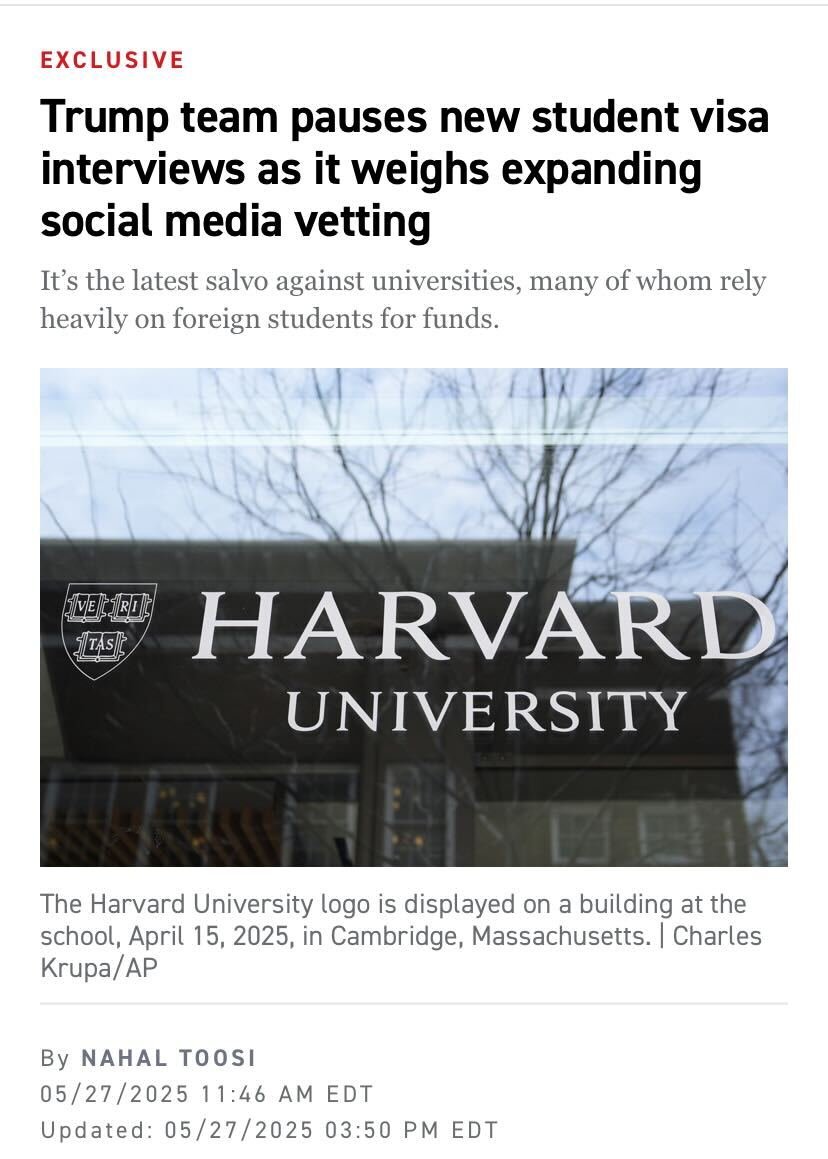
Jeremy Neufeld
@JeremyLNeufeld
Director of Immigration Policy @IFP. Also tweets @progress_vibe and @livecivilwar
The best way for the US to stay ahead of China is to poach their talent. It’s reasonable to target individuals who pose a real security risk, but it’s self-sabotage to go after anyone in a broad field like AI. ~90% of Chinese STEM PhDs stay in the US and help us keep an edge.
The U.S. will begin revoking visas of Chinese students, including those with connections to the Chinese Communist Party or studying in critical fields.
Hoping we adopt a targeted approach to research security. But mass revocations of Chinese student visas will undermine US tech advantages. >80% of Chinese STEM PhDs stay in the US post-grad. When they do, the US benefits. Intl students are core to US S&T. Here's why 🧵 /15
The U.S. will begin revoking visas of Chinese students, including those with connections to the Chinese Communist Party or studying in critical fields.
Wait, did we actually brain drain this guy from China?
Recruiting talented scientists for my new lab in Austin, Texas. My email: [email protected]
We really need to switch to waged base selection for the H-1B visas. @JeremyLNeufeld
Among the top 10 client companies we analyzed, contract H-1B software developers were paid $48,000 less than those employed directly - even after accounting for education-level and age. 1/3 of such contractors were paid exactly the minimum salary legally required by the DOL.
Finally, student visa arrivals are critical to America’s R&D ecosystem. Workers who first came to the US on student visas are more than twice as likely to hold jobs doing basic or applied R&D as native-born college grads.
Census says less than 30% of STEM degree holders work in STEM. But when you actually ask STEM grads "does your job relate to your degree?" 79% say yes, the same rate as non-STEM grads. People are writing books about failed STEM investments that are based on bad data.
We should be doing everything we can to keep people like this.
I came to the US on an F-1 student visa. Since then, I’ve built a company worth over $20 billion—headquartered in Pennsylvania. Student visas are one of America’s greatest talent funnels. Let’s not close the door behind us.
You’re a young policy entrepreneur, mid-commute, daydreaming about abundance and scrolling Twitter, when suddenly you see this. Can it be? It can. It’s @wmataGM on Statecraft. statecraft.pub/p/how-to-save-…
War refugee turned Nobel prize winning scientist in the US posts about Trump administration cuts to funding for his biomedical research "Within hours" he gets an email from China offering to move his lab to any Chinese city with guaranteed funding for 20 years
US visa wait times are out of control.
Australia processes 90% of tourist visas within 23 days. The UK reports 21-day processing times. But the US takes 84 days on average, with many consulates taking >1 year. Long wait times for visitor visas threaten $1 trillion in international tourism and need to be fixed.
5.29.25 – @JeremyLNeufeld on today to talk about how U.S. immigration powers innovation: • 70% of top AI founders came on student visas • How programs like OPT keep America competitive • What a “Project Paperclip 2.0” could look like
Today, using new data, we update these estimates. Over the last decade w/ data, I find that only 37% of international graduates ultimately stay in the U.S., including only 18% at the BA level and 43% at the master's degree level. 4/7
New: The last two weeks have been potentially devastating to America's ability to attract top talent. Between visa bans, revocations, and the possibility of cancelling international graduates' ability to work after school, our talent retention problem is about to get worse. 1/7
New uncertainty for students just as we're approaching the traditional peak for student visa appointments (May and June)...

(1/8) Harvard has more than 5,700 post-docs in the sciences, engineering, and health, and more across other disciplines. In general, about half are international researchers bringing their talents here. Here’s what *you* can do to help retain top research talent in our country.